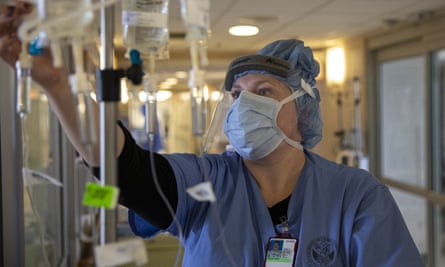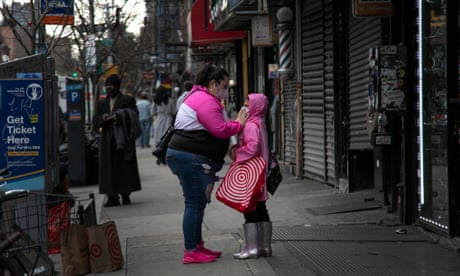Pediatric Multi-System Inflammatory Syndrome Associated with COVID-19
"There has been at least three fatalities because of this [new COVID-associated syndrome] and there may be others that are now under investigation. This is every parent's nightmare, right, that your child may actually be affected by this virus."
"While rare, we are seeing some cases where children affected with the COVID virus can become ill with symptoms similar to the Kawasaki disease or toxic shock-like syndrome that literally causes inflammation in their blood vessels."
"We were laboring under the impression young people were not affected by Covid-19. ... We're not so sure that that is the fact anymore.We still have a lot to learn about this virus."
"The illness has taken the lives of three young New Yorkers. This is new. This is developing."
"We thought children could be vehicles of transmission ... but we didn’t think children would suffer from it."
Governor of New York, Andrew Cuomo
 |
| A nurse adjusts intravenous drug dosages being given to a Covid-19 patient. Photograph: Robert Nickelsberg/Getty Images |
Yet another shock for the world that had initially been convinced that the SARS-CoV-2 virus that causes COVID-19 poses little harm to children, focusing instead on the elderly and the immune-suppressed and other health-vulnerable people, leaving the great middle of any population relatively unscathed. Little by little as the highly infectious virus stealthily makes its successful way through one population after another around the world, surprising new discoveries are made of the complexities involved with its symptoms and the syndromes in specifically affected populations.
 |
"We want to reassure parents – this appears to be
uncommon. While Kawasaki disease can damage the heart or blood vessels,
the heart problems usually go away in five or six weeks, and most
children fully recover."
“Rarely,
but sometimes, the coronary artery damage persists. Because of this,
Kawasaki disease is the most common cause of acquired heart disease in
children in developed countries. Prompt treatment is critical to prevent
significant heart problems."
Dr Jane Newburger, director, Kawasaki program, Boston Children’s Hospital
A new risk has arisen out of the global pandemic named COVID-19 caused by the SARS-CoV-2 virus that originally emerged in Hubei Province's Wuhan City, China. New York State has seen 73 admissions to hospital of children suffering a peculiar inflammatory syndrome being linked to the novel coronavirus. Three children have so far died of the syndrome experts identify as akin to toxic-shock of a kind known for the effects that Kawasaki disease identifies.
Britain first reported cases of rare, life-threatening inflammatory illnesses in children with a perceived connection with COVID-19 exposure, as did Italy and Spain. And now in the United States doctors are beginning to report clusters appearing in children admitted to hospital with the disorder, one that can attack multiple organs, impair heart function and weaken heart arteries. The deaths of three children (one a young teen) in New York attributed to COVID-19's effects are the first to be reported in the U.S.
This newly-recognized impact of the novel coronavirus on children has symptoms similar to those seen in toxic shock and Kawasaki disease, associated with fever, skin rashes, swelling of glands and inflammation of arteries of the heart in severe cases. Scientists are still not positively convinced whether the syndrome has firm links with the novel coronavirus since not all children suffering from it have tested positive for COVID.
Symptoms:
- Prolonged fever (more than five days)
- Difficulty feeding (infants) or is too sick to drink fluids
- Severe abdominal pain, diarrhea or vomiting
- Change in skin color - becoming pale, patchy and/or blue
- Trouble breathing or is breathing very quickly
- Racing heart or chest pain
- Decreased amount of frequency in urine
- Lethargy, irritability or confusion
Labels: Children, COVID-19, Pediatric Multi-, System Inflammatory Syndrome

0 Comments:
Post a Comment
<< Home